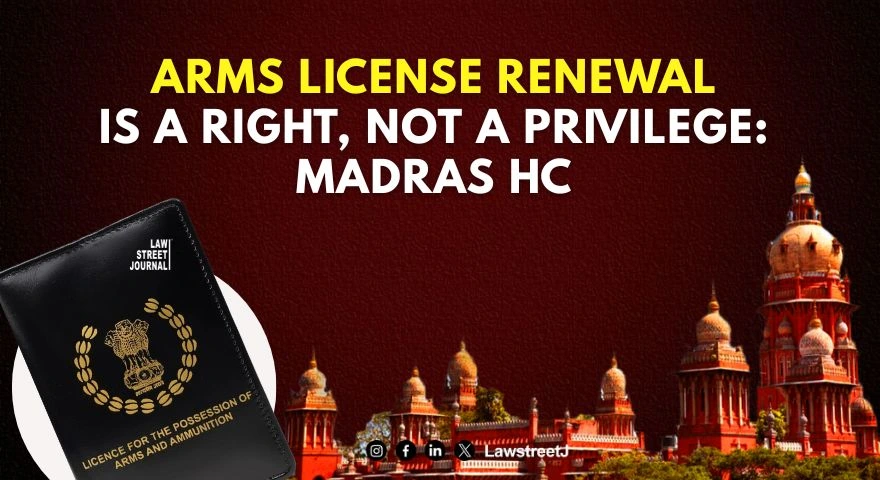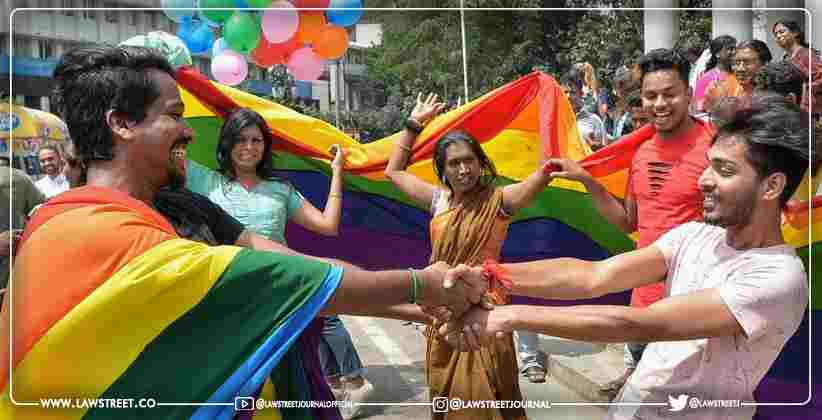Chennai: The Madras High Court has observed that while obtaining an arms license is initially a privilege, once granted, it transforms into a right at the stage of renewal, shifting the burden to the licensing authority to justify any refusal under Section 14 of the Arms Act, 1959.
Justice G.R. Swaminathan made these significant observations while quashing an order refusing renewal of a gun license to a petitioner solely on the ground of pendency of a motor vehicle accident case under Section 304A IPC.
The court was hearing W.P.(MD) No. 23614 of 2025 filed by Magudapathi, challenging the order passed by the District Magistrate-cum-District Collector, Dindigul, dated November 21, 2024, refusing to renew his gun license.
The petitioner was issued a gun license in 2021, which was also renewed once. However, the second renewal was denied despite the Revenue Divisional Officer recommending the case. The District Collector rejected the renewal request on the ground of pendency of a criminal case against the petitioner.
The first respondent contended that the petitioner was facing a criminal case which could endanger public safety, and argued that he should first obtain an order of acquittal or approach the appellate authority, the Additional Chief Secretary/Commissioner of Revenue Administration, Chennai, within 30 days.
Justice Swaminathan examined the relevant provisions of the Arms Act, 1959, particularly Sections 13 to 15 found in Chapter III, dealing with the grant, refusal, duration, and renewal of licenses.
The court first clarified the constitutional position on the right to bear arms in India. Justice Swaminathan noted, “Unlike the Second Amendment to the Constitution of the United States, which confers on the people the fundamental right to keep and bear arms, the Indian Constitution nowhere provides for any such right.”
The court referred to the evolution of jurisprudence on this issue, noting that Justice Markandey Katju had held in Ganesh Chandra Bhatt vs. District Magistrate, Almora (AIR 1993 All 291) that the right to bear arms was embedded in Article 21 of the Constitution. However, this was overruled by a larger bench in Rana Pratap Singh vs. State of UP (1996 Crl.LJ 665), establishing that there is no right to bear arms in India—it is only a privilege conferred by the Arms Act, 1959.
Justice Swaminathan explained the distinction between right and privilege, stating, “There is a distinction between right and privilege. If I have a right, it postulates the existence of a correlative duty on another. But in the words of Hohfeld, privilege is the negation of a duty.”
However, the court made a crucial distinction between the initial grant and renewal of licenses. Justice Swaminathan observed, “Even though Section 13 of the Act shall apply to the renewal of a license sought under Section 15, it is clear from the language employed in the statutory provisions that an application for grant of a license and an application for renewing a license already granted do not stand on the same footing.”
The court explained that when an applicant seeks a license under Section 13, the authority must be satisfied that the person has a good reason for obtaining it. If the authority concludes the applicant has no good reason, rejection can follow. While such orders are amenable to judicial review, whether the reasons are good enough will not be subjected to too rigorous scrutiny.
However, Justice Swaminathan emphasized that renewal applications stand on “a better and higher footing.” Analyzing Section 15(3) of the Act, which states that every license shall be renewable unless the licensing authority for reasons recorded in writing otherwise decides, the court held that while the burden is on the applicant to make out a case for grant of license, the onus shifts to the authority when renewal is sought or refused.
The court stated, “Thus, the licensing authority will have to show that the applicant’s case attracts one of the grounds under Section 14. The reason assigned by the authority for rejecting renewal will be subjected to greater scrutiny as the test would be whether the authority has discharged the burden cast on it.”
Justice Swaminathan further observed, “Non-renewal of an existing license is usually a more serious matter than refusal to grant a license in the first place. Unless the licensee has already been given to understand when he was granted the license that renewal is not to be expected, non-renewal may seriously upset his plans and perhaps cast a slur on his reputation.”
The court relied on the principle articulated by De Smith in Judicial Review of Administrative Action regarding the legitimate expectation of renewal, and cited the Karnataka High Court’s judgment in State of Karnataka vs. G. Lakshman (ILR 1987 Karnataka 2223), which held that “a privilege to get a license may fructify in itself into a right at the time of seeking renewal of a license.”
Justice Swaminathan concluded on this point, “Thus, what was a privilege which could be granted or refused at the discretion of the authority at the time of issuance of the license metamorphoses into a right to be granted renewal unless the grounds under Section 14 get attracted.”
On the specific facts of the case, the court found that the petitioner was being prosecuted only for an offence under Section 304A IPC for causing a motor vehicle accident. Justice Swaminathan held, “By no stretch of imagination can this endanger public safety. Only those incidents that adversely impact the even tempo of societal life would fall within the category of public safety or public order. A case of fatal accident due to negligence would not fall under such a category.”
The court noted that the petitioner was not accused of having misused the license issued to him, and therefore the reason for rejection was clearly unsustainable.
The court also rejected the respondent’s argument regarding non-exhaustion of appellate remedy, observing that it is well settled that the rule of exhaustion of statutory remedies is a rule of policy, convenience, and discretion, and does not divest the writ court of its power under Article 226 of the Constitution.
In its final order, Justice Swaminathan quashed the impugned order and directed the first respondent to renew the petitioner’s arms license, with appropriate conditions that may be stipulated.
Mr. S. Sarvagan Prabhu appeared for the petitioner, while Mr. M. Lingadurai, Special Government Pleader, appeared for respondents 1 and 2, and Mr. A. Albert James, Government Advocate (Criminal Side), appeared for respondent 3.
Case Title: Magudapathi vs. The District Magistrate-cum-District Collector, Dindigul & Ors.




![TN Medical Council declares change of gender identity of LGBTQIA+ as misconduct [Read Notification]](/secure/uploads/2022/12/lj_5268_5cebb05a-97fb-40fb-8045-25cdf8f4207a.jpg)
![Madras High Court Directs Tamil Nadu Government to Ensure Quota for Transgenders in Local Body Elections [Read Order]](/secure/uploads/2023/08/lj_2507_7a03d113-08b1-4670-b6fb-9058aee481d0.jpg)
![Anti Corruption sleuths acted like "puppets in The Muppet Show", HC notice to ex TN CM in disproportionate assets case [Read Order]](/secure/uploads/2023/09/lj_8675_7b37fc02-1b2d-4f4a-9816-3df20545b37e.jpg)




